 Tan Sri Abdul Rashid Abdul Rahman regrets agreeing to the indelible ink request.
Tan Sri Abdul Rashid Abdul Rahman regrets agreeing to the indelible ink request.A magnet for controversy and a target of constant attacks, former Election Commission chairman Tan Sri Abdul Rashid Abdul Rahman has never shied from the limelight. He talks to ANIZA DAMIS and ELIZABETH JOHN
Q: In the 25 years with the Election Commission (EC), do you regret any decisions you have made?
A: My only regret is I should not have agreed to the request for the indelible ink. I agreed in good faith because I wanted to show that if this could assure voters and put to rest all allegations of cheating, then we would go ahead and do it. And because we could not do it, I regretted the decision to have the indelible ink.
This was the worst thing that happened in my career. The government rejected our proposed law.
Q: Did they reject it because it was unconstitutional or because it was disadvantageous to them?
A: I don't think it was disadvantageous to them because the prime minister and the deputy prime minister agreed.
I went to see them long before, and told them: what has the party in power got to hide? Nothing. There's no cheating in the elections. If this is a way to ensure there is no cheating, why not? It doesn't cost us very much. So they agreed.
But the attorney-general felt we were going beyond our right to impose conditions and possibly put hurdles in voters' way that they might not turn up.
That meant we were trying to deter people from voting or imposing some kind of 'roadblock'.
So, the government said we should give people a choice. If you don't want (to be inked) it's okay. We still have to give you (the right to vote). But that's ridiculous. What kind of law is that? It's not conclusive.
Q: In the end, what was the reason given for the cancellation?
A: It was ultra vires the Constitution -- Article 119.
Q: What about those police reports?
A: That was also another reason. But the constitutional issue was strong enough a reason. I had the feeling that if I continued with it, I would be impeached in Parliament. I was trying to find the means but the A-G said no, don't take that risk.
Q: Do you think he was justified in making that decision?
A: They are the law experts. I cannot say it is not a justifiable decision. They know what they are saying. If people are not happy, they can go for a judicial review. Take it to court.
Q: What happened to the indelible ink in the end? Were we able to sell it and recoup our losses?
A: I was told it has been disposed of. How, I don't know. I was told it had been disposed of through the proper channels.
Q: It's been nearly a year since the elections. Do you see that the government has changed its mind about introducing indelible ink?
A: Opposition parties will have to get the party in power to talk. If they are really interested in getting all this done, they should get the government to review the law.
Q: When the indelible ink thing happened, you were very quiet at that time. Usually you have lots of things to say.
A: I was working very hard, running here and there. I felt very sad I was not able to do that (use the ink). I was trying my best to think of how to do it. I didn't want to talk to people about anything. People were asking when I was going to do the training (on applying the ink on voters' fingers) but I couldn't tell them as the government had told me that I couldn't do this (introduce the indelible ink).
But still I tried, until I was told that I would get into trouble if I did it, that I could be impeached. That's when I abandoned it.
That's why it was only on the 4th (of March) that I announced it. I should have announced it on the 13th (of February) when I was told -- the day when Parliament was dissolved. I thought: mati lah saya itu macam (Oh no, I'm done for).
I felt like resigning but I was persuaded by my staff not to. If I had resigned, there would have been a big crisis.
Q: But it might have sent a very clear message about yourself.
A: A clear message, yes. But it would have been very bad for the country. I discussed it with my staff.
Q: When the government told you on the 13th, didn't you ask them why they didn't tell you earlier?
A: The cabinet only sat on the 13th just before the dissolution. They did not indicate to me that they were going to reject it.
Q: But even so, there would have been a need for parliamentary amendments.
A: They could have stood their ground and let us use it. And then, let the people challenge (its constitutionality) in court.
And who would have wanted to challenge it?
The opposition wouldn't have challenged it because they are the ones who asked for it. It would be stupid for them to challenge it. I was told: "We were advised by the A-G".
I asked: "Who persuaded him?"
Q: Who persuaded him?
A: I don't know.
Q: You said the stamp duty issue arose because someone from the legal fraternity pointed it out to the A-G. Who was that person?
A: From the A-G's Chambers. I think somebody alerted the A-G's Chambers.
And we were blamed for that. All these years, we never had stamp duty. Suddenly, we were told to impose it. If they had ignored it, it would have been all right, because that's been the practice all along.
Q: But about the possible impeachment, was that brought up by the A-G's Chambers also?
A: No. I was asked to think deeply about it, because I would be going against the Constitution. That was when I knew it was over.
Q: In hindsight, do you wish you had created a fuss at the time?
A: No. I wouldn't do such a thing.
Q: But you were very disappointed?
A: Completely disappointed. I could not do what I wanted to do, as my last service.
By right, if there is a big demand for that kind of thing, the EC has to comply because it relates to public confidence.
Q: On your first day of retirement, you announced that you were going to sue some politicians. Why?
A: They said things which indicated that I was corrupt and biased towards the government.
These people will have to prove that in court. I want to know exactly what I did.
Q: Why not just leave all that behind instead?
A: No, I cannot keep quiet. I cannot let it go just like that. Why did that fellow have to say that? Why did he have to tarnish my image?
I can go on stage and talk if I want to but I am bound by the Official Secrets Act. That's why I take people to court.
You tell the country, you tell the court what I took. Prove it, don't just say it.
Q: Who are the people you intend to sue?
A: I will not say. It is with the lawyers. It may not even go through. The lawyers may advise me to forget it.
Q: How many do you intend to sue?
A: Below half a dozen.
Q: For how much?
A: It's not for the money. I want an apology.
Q: Why did you wait until you retired before you sued these people?
A: I don't want to get the Election Commission involved. I want to do it as Rashid, because they attacked me as Rashid.
Q: Are you going to join a political party?
A: I am studying all these political parties. If I join, I would want one that is multiracial.
There are some multiracial (parties) in terms of their constitution but not membership.
Q: Is there any party that you feel is truly multiracial?
A: There is.
Q: After all these years of being a civil servant, you would consider being a member of a political party?
A: I may consider.
Q: Do you have any aspirations to run for elections?
A: No. If I join a political party, I may be able to help that party in electoral matters.
To change from being an administrator to being a politician is tough.
Q: So, you might join a political party, but not run for elections?
A: No. I have never aspired to be a candidate. I may join, not that I'm certain of it.
Q: Have you been approached by any political party to be an election consultant?
A: No. But I've been approached by a university to be a professor.
Q: Are you going to take that up?
A: No, I have not replied. But I am hanging on to that letter.
Q: Why are you interested in a multiracial party?
A: I think it's time this country looked at the people's representative as a representative for all. Not just Umno for Malays, and MCA for Chinese.
You cannot go on in that manner. I think it's time we relooked this.
A wakil rakyat must represent all. Just because he's Indian, he shouldn't only talk about the Indians.
I wonder what this representative in Kapar is trying to do. He talks so much about the Indians suffering, as if the Chinese and Malays there are not suffering.
I know Kapar very well. If you go beyond the main road, it's terrible. It's a slum, and people from all backgrounds are suffering.
They need help badly in Kapar. I wonder why this man only talked about the Indian community.
Of course, maybe they need the most help; but you can't talk that way.
I think this country needs multiracial solutions to multiracial problems. We should not go separate ways in tackling problems. Poor is poor, no matter what.
Take care of every Malaysian. Make sure they have enough to eat, clothes to wear, schools to attend.
Q: The political party that you identify, is it in the government or opposition?
A: Where is there a multiracial party in the government?
People misunderstand me. Even Parti Keadilan Rakyat thought I supported the party in power because when I gave a talk somewhere, I said given the multiracial, multireligious setup in the country, the only party that can run it is the party that appeals to all.
The party that can solve all these problems is the Barisan Nasional because it is the marriage of so many racial parties. Together, they can strike a balance and an understanding. They sit down and they run the country.
So, in the absence of any other party that has the same kind of appeal and ability, the BN is the only party that can run this country.
That's what I said, within that context. But they took as me saying that only BN can run this country.
Q: Does the opposition think you are anti-opposition?
A: Because their demands are not met. And they are not met because I have no power.
They should be grateful to me, because of what I say. If you want to run this country, there must be a two-party system. You must offer an alternative.
I'm glad to see that they got together even though in terms of ideology, they are far apart.
They may quarrel every day until the end of the five-year term, but I hope they stick together because they are running the state governments.
I think the country is moving towards a two-party system, which is good, because you provide alternative solutions.
Q: How serious are you about joining a multiracial party?
A: Serious, but nobody has asked me to join their party.
Q: How would you rate your 25 years with the Election Commission (EC)?
A: I'm quite happy to have been there for at least six general elections.
We have delivered free and fair elections and, most importantly, we have given the country a legitimate government.
People have not had their rights taken away.
There is a choice in this country. Voters are able to vote freely and political parties have been able to take part in the electoral process.
Q: Bukit Bendera member of parliament Liew Chin Tong called your term as EC chairman "an unmitigated failure". He said you did not carry out any electoral reforms.
A: It is not our job to do that. That's not in our terms of reference. We merely give indications. It is for political parties to pressure (the government) because reform depends very much on political will.
Q: You keep talking about the laws that the EC has no power over and that the government does. Are you implying that ruling parties do not play fair?
A: No, these laws are just there. The EC is only given half or three-quarters of the powers it should have. That's why I made the demand to put us in full control.
The power over security during the campaign lies with the police. Then, the Information Ministry takes the major part of the function to control the media.
For corruption, there is the anti-corruption body. And for other things, it is other authorities. The right to put up posters and banners is under the local authorities.
So, many people play a role during the elections. And if people don't like them, it reflects on the electoral process. If that reflection is bad, it boomerangs onto the EC.
Although we have made tremendous achievements in the elections, nobody seems to be thankful to us.
People don't see it in that light because people don't understand electoral laws.
Q: Is it possible to achieve the perception of free and fair elections here?
A: It's possible. It's not difficult. You review the law. I told the prime minister all the problems.
Q: Do you think there is sincerity in the government or opposition to ensure a free and fair election?
A: Is the country ready to take on changes in the electoral process? That's debatable.
When we began introducing electoral laws in 1957, we had these three very big sensitive matters: racial, religious and cultural.
On top of that, we had a rural-urban divide.
I consider these as matters that influenced the government then to limit the EC to handling only the basic things in an election. There must be a debate on this. The government should have taken the initiative to call for some kind of forum.
So, what extent of freedom, what basic fundamental rights are people going to be given as candidates or voters?
Are we ready to have changes in our democratic practices? Can we give total freedom to everybody? Can they go shouting all over the place, touching on sensitive matters?
When you talk of an electoral democracy, you have to think of all this. Are you not going to impose a permit for people to go canvassing?
They don't do this in other countries. Just tell the police: "I'm going to have a gathering in front of Bangsar Village."
Is that possible here? No. But in some countries, it is.
Q: Do you think the EC's public relations are not well handled?
A: We have meetings and dialogues. But when we tell them that something is beyond us, they are not happy.
We are being handicapped by the fact that within the law, there are missing components.
All the demands that came to the commission are beyond our powers. You have to ask the government, because the commission doesn't make laws. How we wish we could comply.
Q: How much sway do politicians or the government have over the EC?
A: In terms of law-making and the interpretations of laws, we have to go through the government.
In other words, when we are seen to be handicapped and there is no will on the part of the ruling party to correct that handicap, we are under their control.
Whoever is controlling the government will have the advantage to call the shots.
They have the advantage of deciding when to dissolve Parliament or to control the media. But it should be under the EC during the elections.
Q: Have you ever had to fix an election?
A: No.
Q: Have you ever been asked to assist in the outcome of an election?
A: No, never. Had I been asked, I would have resigned long ago. I would not want to do that kind of job.
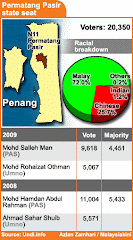

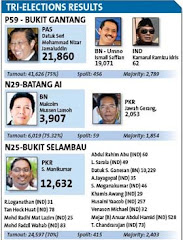

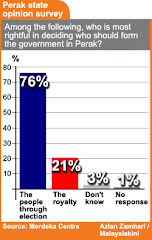
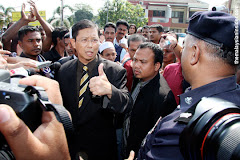
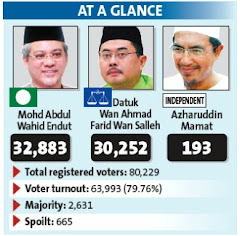
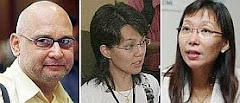

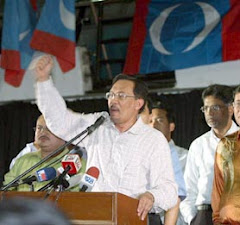

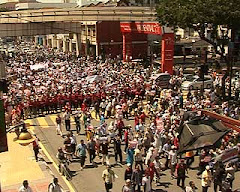

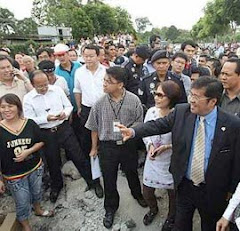
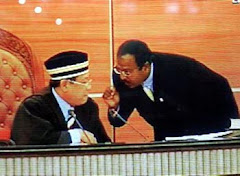


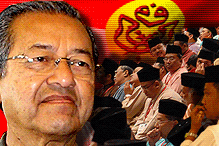
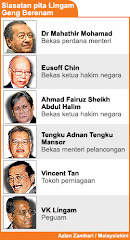
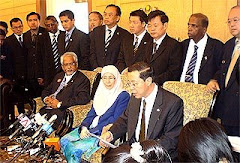
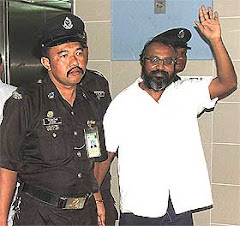
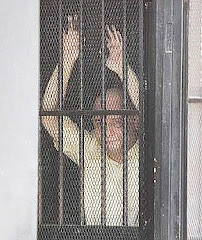
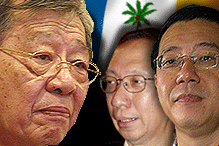

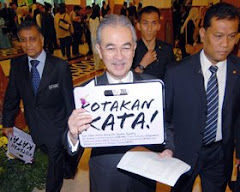
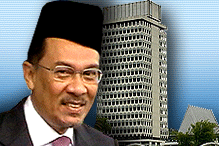
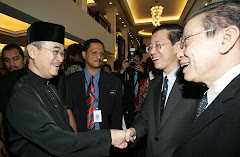






No comments:
Post a Comment